Uncategorized
Picking a new rabbi? A new novel about a church shows how
(JTA) — About a decade ago, I served on my synagogue’s rabbinic search committee. Normally I am allergic to any activity at which minutes will be taken, but it was a great experience, thanks to the care and intelligence that my fellow committee members brought to the process. Flush with satisfaction for a job well done and probably a little full of ourselves, we even imagined other synagogues might learn from our example. We spoke about putting together a seminar, or perhaps a how-to book.
No one, I recall, suggested turning the experience into a novel.
That’s why I’m not Michelle Huneven, who this year published a novel about a church’s search for a new minister. I’ve been recommending it to anyone who wants to understand shul politics, or wants reassurance that Jews are just like everybody else, no more and no less.
“Search” is narrated by Dana, a 50-something restaurant critic, former seminarian and once-active congregant at a Unitarian Universalist church in Arroyo, California, who is recruited to the search committee when the current pastor announces plans to retire. The book tracks the search process from in-house focus groups to Skype interviews with applicants to the finalists’ “candidating week” — what you and I might call “auditions.”
Despite an unlikely premise for a mainstream novel, ”Search” is a smart, funny and enlightening book about contemporary religion, especially of the liberal, undogmatic variety that is typical of Unitarian Universalism and, well, much of non-Orthodox Judaism. It’s a worthy companion to “The New Rabbi,” Stephen Fried’s 2002 nonfiction book about a Philadelphia-area synagogue and its own search.
Huneven captures the impossible nature of a clergy person’s job, and especially the unrealistic expectation of congregations that want their spiritual leader to be all things to all people. Trying to narrow down what they are looking for, members of the search committee call out qualifications:
“‘Sermons with more spiritual depth and intellectual content,’ said Charlotte.
“‘Someone with an efficient, organized management style,’ said Belinda.”
Wonders Dana: “Who didn’t want a warm presence with a progressive social conscience, the management skills of a corporate CEO, and the work-life boundaries of a New Age life coach?”
As the Conservative movement’s Rabbinical Assembly warns in its manual for search committees, searches founder “not because of a dearth of qualified candidates but because the congregation’s expectations of rabbinic candidates is unrealistic.”
Regular synagogue-goers will recognize the tensions in the novel between the older members and the newcomers, between boomers and millennials, between theists and humanists. At one point, the assistant minister remembers when a midweek service led by a student intern began attracting a core of people who weren’t showing up on Sundays.
“You can’t have two congregations, no matter how small one is,” she explains. “It sets up a potential schism.”
Clergy searches are fraught because nearly every congregant regards themself as the rabbi’s boss. On the flip side, members grow attached to longtime rabbis, even when they outlast their changing congregations. In “Search,” the senior minister has been with the church for eight years, but remains under the shadow of his beloved predecessor, who had served for 28 years. (I was married by the “new rabbi” at my wife’s family’s synagogue, who at that point had been on the job for about 20 years.)
“Search” isn’t a satire, exactly, but Huneven has fun with the political and social winds that are blowing through liberal denominations. Some of the congregants are set on hiring a woman after almost four decades of male leadership. “But we can’t say that explicitly,” Dana warns. Another character is angling to be the head of the national church association, “though it’s not such a clear shot for straight white guys these days,” says a church consultant.
Unitarian Universalist, or UU, churches are also staunchly secular, which means the clergy don’t have to express a belief in God, let alone Jesus or a strict theology. That brings with it the paradox of choice: “Our ministers can be gay, trans, Buddhist, atheist, any race, or same-sex adoptive parents with mixed-race families. You name it,” says a member of the committee. “That’s the future. Everybody’s in.”
I would guess that a lot of liberal synagogues would love to be as open and diverse as that, but bump up against the reality that, despite a growing number of Jews by choice and Jews of color, synagogues tend to be white, upper-middle-class and heteronormative. As for theology, rare is the synagogue that doesn’t want its rabbi to “have been inspired to serve God,” as the R.A. handbook puts it; on the other hand, search committees disagree about how much theology and “God talk” they want from the bima.
And yet, even the most secular UU church or most liberal synagogue pursues the sacred in the ways they gather, worship, mourn and serve the community. As the squabbles intensify in “Search,” one older member of the committee laments that they’ve lost sight of their goal: how the search for a new clergyperson is a “a sacred task that will grow us spiritually.”
During my time on the search committee, I saw the sausage-making of synagogue life. Compromise is always hard. Even the most thorough, transparent search process is bound to disappoint someone.
And “Search” the novel can be, at times, as tedious as a real-life rabbinic search, as characters deliberate over candidates at painstaking length. But Huneven understands that holiness is not just a matter of reading from a prayer book or studying from a text, but lives in the way people create communities and choose their leaders. It’s a messy process, but if you do it in good faith and in a spirit of humility, you might end up with a pretty great rabbi.
—
The post Picking a new rabbi? A new novel about a church shows how appeared first on Jewish Telegraphic Agency.
Uncategorized
What will become of the Dutch farm school that saved my father from the Nazis?
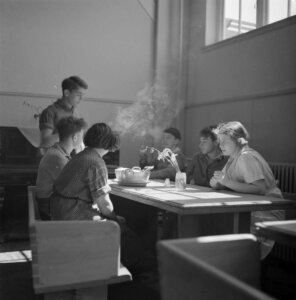
In North Holland, a grand community house rises above neighboring farms. Built in 1936 by students of Werkdorp Wieringermeer (Werkdorp means “work village”; Wieringermeer was the name of the township), the building held the dining room and classrooms of a Jewish farm school. A stunning example of Amsterdam School architecture, the Werkdorp’s brick and cobalt-blue facade dominates the polder, or land claimed from the sea.
Today, the land grows tulips. Nearby, Slootdorp (“Ditch Village”) honors the canals that carry the water away.
In 1939, the school sheltered 300 German-speaking Jewish students, including this reporter’s father, who arrived, his head shaved, on Jan. 4, from Buchenwald.
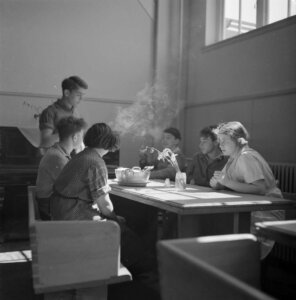
Why a Jewish farm school? In the 1930s, most young German and Austrian Jews were city dwellers and had no idea how to milk a cow, raise chickens, or plow land. But as the Nazis barred Jews from education and professions, farm laborers were the immigrants most wanted by the handful of countries accepting Jewish refugees.
Some 30 such training schools were established in Germany, modeled on the hachsharah throughout Europe that taught Jewish youth the skills to settle in what was then Palestine. The Werkdorp, the largest in Holland, was non-Zionist. Its objective was to send young farmers to any country that would take them.
Today, volunteers have assembled a grassroots museum that showcases the Werkdorp’s years, 1934 to 1941. Pinned to the walls inside are pictures taken by the Russian-American photographer Roman Vishniac, who visited in 1938, and by the Dutch photojournalist Willem van de Poll. They show students haying, plowing, feeding chickens, baking bread.

Also on the walls are images of the nearly 200 Werkdorpers who were not as lucky as my father. The Nazi official Klaus Barbie — who became known as the “Butcher of Lyon” for his harsh treatment of resistance fighters there — rounded up the Werkdorpers in 1941 and sent them east to concentration camps, where they were murdered.
A scroll of those victims’ names hangs near the entrance. In the huge kitchen, you can still see the kosher sinks, one tiled red and white for dishes for meat, the other black and white for dairy. Otherwise, the three floors of the great hall stand largely empty.
Protected from demolition by the Netherlands Agency for Cultural Heritage, the community house and its land have been owned since 2008 by Joep Karel who runs a private real estate company that builds housing. Karel pays for the building’s upkeep and opens it to cultural groups and schools.
But the developer has a grander plan. He wants to create a modern memorial center that tells the story of the Werkdorpers and the polder. To fund his venture, he would erect housing behind the community house, to be rented by migrant workers. In April 2020, the council of Hollands Kroon — the Crown of Holland, as the township is called today — approved such housing for 160 workers.
The organizers of the museum are uncertain: Will the project enhance their efforts, or thwart them?
A hero or a collaborator?
North Holland juts like the thumb of a right mitten into the North Sea. A decade before the community house was inaugurated in January 1937, the land beneath it was seabed. The first students, 11 boys and four girls, arrived in 1934 to live in barracks that had housed the polder’s builders. Their task: to build a school.
The farm school admitted refugees for a two-year course. Its purpose was to help them emigrate, the only way The Hague would allow the school to function. Residents spoke German; there was no need to learn the language of one’s temporary home.
Gertrude van Tijn, a leader of the Dutch Jewish refugees committee — tasked with finding countries that would accept thousands of Germans and Austrians forced to flee the Nazis — handled admissions. Most of the Werkdorp’s budget came from Dutch Jewish donors, with contributions from Jewish groups in Britain and America. Students’ families paid fees if they could.
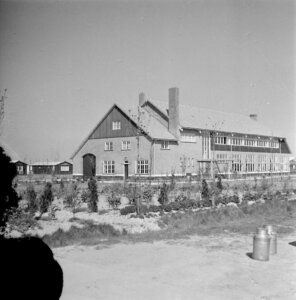
The school was internationally recognized. James G. McDonald, the American high commissioner for refugees of the League of Nations, attended its opening ceremony. The legal scholar Norman Bentwich praised the village in The Manchester Guardian. Although the school was non-Zionist, Henrietta Szold, a leader of Youth Aliyah, brought 20 German teenagers there in 1936.
Werkdorp Wierengermeer helped at least 500 German and Austrian Jews, ages 15-25, escape the Nazi regime.
It was Van Tijn, a German Jew who’d married a Dutchman, who got my father, George Landecker, out of Buchenwald. He had been arrested in Frankfurt on Kristallnacht, the November 1938 pogrom, and sent east by train to Buchenwald.
In the camp he met his friends and teachers from Gross Breesen, a farm school in eastern Germany, from which he had graduated that May. Breesen was the Werkdorp’s sister farm school. By admitting the Breeseners and my father to the Werkdorp, Van Tijn got Dutch entry permits for all.
For the Gestapo in January 1939, such proof that a prisoner could leave Germany secured freedom.
Van Tijn saved thousands of young people like my father, but she worked with the Nazis to do so. After the war, historians and people seeking to repatriate Dutch Jews called her a collaborator. She moved to the United States and wrote a memoir, in which she criticized other Jewish leaders for their decisions under German rule. According to her biographer Bernard Wasserstein, she never published the memoir because she didn’t want to make money from describing the atrocities she had seen.
When my father arrived in 1939, the Werkdorpers were cultivating 150 acres — there was wheat, oats, rye, barley, and sugar beets for the animals: 60 cows, 40 sheep, and 12 workhorses. The residents raised chickens, grew vegetables, and baked their own bread. The school taught carpentry, welding and plumbing, skills I would see my father use, not always deftly, later as a dairy farmer in New York state. (Dad was a good farmer, but he was less than expert in all the other skills a farmer needs.)
My father got a visa to America and left Rotterdam on the steamship Veendam, arriving in New York on Feb. 5, 1940. Three months later, the Nazis invaded Holland, cutting off all routes of escape.
‘Their names should be spoken’
Over the decades, Wieringer residents have found ways to commemorate the residents who died.
Marieke Roos, then a board member of the Jewish Work Village Foundation, proposed a monument of their names. She raised funds and recruited volunteers. Completed in 2021, the memorial comprises 197 glass blocks embedded in a semicircle at the building’s gateway. They mirror the layout of the dorms, now long gone, which once embraced the rear of the community house. Each block commemorates a student, teacher, or family member deported and murdered. One honors Frits Ino de Vries (1939–43), killed at Auschwitz with his mother and sister, Mia Sara, who was 5.
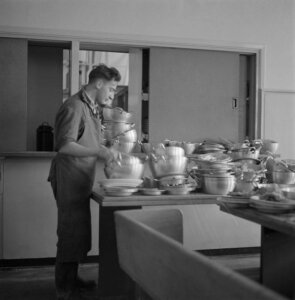
Corien Hielkema, also from the foundation, teaches local middle schoolers about the Werkdorpers’ fate. Each student creates a poem, painting, or website about a Werkdorper because “their names should be spoken and their stories told,” she told me.
Rent from migrant workers may sound like an unusual way to fund a memorial center. But in Joep Karel’s plan, such housing would be built behind the community house, and would be reminiscent of the dormitories where my father lived. Hollands Kroon’s biggest exports are flowers, cultivated by workers from the eastern EU. The region desperately needs housing for these temporary workers. In 2024, the province gave Karel 115,000 Euros to start the project.
Joël Cahen, who chairs the fundraising for Karel’s Jewish Work Village Cultural Center, says that attracting tourists here won’t be easy — it’s a 45-minute drive from Amsterdam, “along a boring road,” he said. Nevertheless, he said he thinks Karel’s idea will work, though “it will take time.”
Some neighbors objected to housing migrant workers, Cahen said. They feared noise pollution, traffic and drugs. Months of legal delay produced a court decision in Karel’s favor, but by then construction costs had skyrocketed.
Now, Cahen said, Karel needs an investor. The developer did not answer a question about how that search is going, except to say, via Cahen, that he would break ground “as soon as possible.” Roos says she has been hearing “soon” for years.
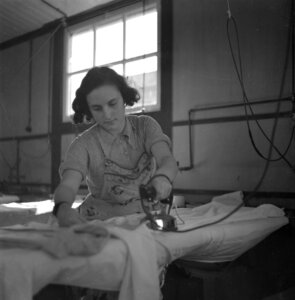
And if the housing were to be completed and the workers arrived, where would they hang their laundry, store their recycling, hide their trash? It would be hard to hide the chaff of daily living on the site’s four acres. Who would visit such a memorial center, and how would the owner keep it running?
Those are legitimate questions, Cahen said. But “we need people to help us push this thing forward. This is a chance.”
Kees Ribbens, a senior researcher at the NIOD Institute for War, Holocaust and Genocide Studies, in Amsterdam, told me that the community house has no “comparable examples in the Netherlands.” It is a “special building,” and a memorial center “would certainly be appropriate.”
Most of the agricultural training centers that saved German Jewish youth have been destroyed or reused. The director’s house of a farm school in Ahlem, Germany, is now a museum. But it became the local Gestapo headquarters, so it also tells that story. The Ahlem school buildings are gone. Gross Breesen, now in Poland, is a fancy golf spa.
The Werkdorp is one of a very few farm schools in Europe whose original building is dedicated to its history.
What my father did and didn’t tell me
My father talked a lot about his first farm school, Breesen. Survivors from Breesen, in America and around the world, remained his closest friends.
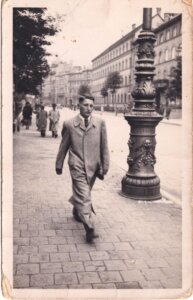
Yet he mentioned his time in the Netherlands only once. My mother had served a Dutch cheese to some guests. Dad told us how he’d been hitchhiking in Holland with a friend, when a truck carrying Edam cheeses had picked them up. They rode in the truckbed, hungry, surrounded by giant cheese wheels.
It was such a slim memory. I assumed he had lived in Holland for a few weeks. I learned only recently that Werkdorp Wieringermeer had protected him from January 1939 until February 1940.
Now I think my father didn’t want to remember his Dutch year. Because like refugees today, everywhere, he was terrified.
Dad once told an interviewer how he’d read a memoir by a man who was arrested on Kristallnacht and transported by train to Buchenwald. My father realized, “That’s me. I did that too.” He had no memory of actually doing it at all.
The brain is good at shielding us from trauma. His year at Werkdorp Wieringermeer may have been like his train ride after Kristallnacht, a time he needed to forget. He was worrying about his parents and siblings, who would not escape Germany until November. (One brother, his wife, and toddler would not survive the war.) He was anxious about the U.S. visa the Breeseners had applied for as a group (they circumvented the American quota on Germans, another story). He had been forced to watch people hanged at Buchenwald for trying to escape.

Yet my father was an optimist when I knew him, and never dwelled on suffering. And I never thought, “I should ask about his experience in the Holocaust because I will want to write about it one day.”
So the only thing I knew about his experience in the Netherlands was that he’d hitched a ride in a truck full of cheese.
An hour’s drive beyond the Werkdorp from Amsterdam, there’s a memorial to the 102,000 people deported from the transit Kamp Westerbork and murdered during the Second World War. It draws 150,000 visitors annually. Cahen hopes the Werkdorp could attract 10,000.
Like Westerbork, the Werkdorp was a transit point — but with a key difference: Many of its residents were saved.
As the daughter of one of them, I hope the tension over the future of its community house will ease, and that someone will make a grand memorial center flourish there.
The post What will become of the Dutch farm school that saved my father from the Nazis? appeared first on The Forward.
Uncategorized
I’m a Zionist. I support Palestinian rights. My campus has no space for people who believe in peace
Our country’s political discourse tends to cast Zionism and the Palestinian quest for statehood as mutually exclusive moral commitments. But as a left-wing Zionist who has never lost his faith in the two-state solution, I don’t find it difficult to be simultaneously “pro-Israel” and “pro-Palestine.”
Unfortunately, there seems to be no space for this middle-ground perspective on my campus.
At Boston University, I’ve found that my peers on my political right share neither my belief in the rights of all peoples nor my understanding of the facts that underlie the Israeli–Palestinian conflict. And the anti-Zionists I know advocate the erasure of Israel’s Jewish identity through its merger with the Palestinian territories as the only just means of resolving that conflict — a stance that doesn’t square with my sense that the most peaceful way forward for the Middle East is for Israel to continue to exist as a Jewish state, and an independent Palestinian nation to be established in Gaza and the West Bank.
Life as an on-campus political outcast has taught me that it’s never been harder to maintain the broader ideal that peaceful coexistence is possible for all the world’s peoples. But it’s never been more important to do so, either.
Out of curiosity, I attended a BU College Republicans meeting last fall and took part in a discussion about Gaza. There, I heard two fellow Jews articulate positions that deeply alarmed me.
One high-ranking member expressed his hope that Israel would forcibly relocate the Palestinians in Gaza, but said he feared what would happen if they sought refuge in Europe. He joked about that potential refugee crisis in a way which made it clear that he saw Palestinians — and Arabs generally — as less deserving of moral consideration than Jews and white Europeans.
Another student with Israeli roots rejected his view, saying she hoped that Palestinians could one day have their own state alongside Israel. But Israel’s occupation of Palestinian land must continue indefinitely, she said, due to Arab rejectionism.
After she spoke, I pointed out that the leaders of the Palestinian Authority have supported the two-state solution for decades. Even more importantly, I said, the 2002 Arab peace initiative sets the enactment of that solution — along with some compromise on issues surrounding Palestinian refugees — as the Arab world’s only prerequisite for recognizing the Jewish state.
But my words fell on deaf ears. She maintained that the Palestinians and several of the Arab states were still devoted to destroying Israel and dismissed some of the sources I attempted to cite in support of my position as “antisemitic propaganda.”
The few Democrats I know on campus with similar views about Palestinians have responded in the same way. We simply cannot agree on the facts, so meaningful discussion proves impossible.
My conversations with anti-Zionists on the left have occurred with greater frequency and have generally run more smoothly. But those exchanges, too, are marked with frustration.
During a casual conversation, one friend told me that she had gotten involved in anti-Zionist activism through a church group called Episcopalians for Palestine and was curious about my opinion on the conflict. I told her that the Jews deserved their own country in Israel for all the hardships they have suffered throughout history, especially the Holocaust. The establishment of a Palestinian state in Gaza and the West Bank would be enough to meet the national aspirations of the Palestinians, I added, even if it wouldn’t be an ideal resolution for them.
But most Palestinians would never accept a compromise that limited their country to 1967 borders, she argued. I replied by informing her of a 2012 poll showing that a slight majority of Palestinians in the occupied territories supported the Arab peace initiative — from which the two-state solution would result. Even after a decade of Israeli intransigence and Palestinian Authority corruption, a significant minority of Palestinians still favor the two-state solution.
So by recommitting themselves to that settlement, I said, the United States and Israel could hopefully work to move Palestinian public opinion back to what it was about a decade ago and work with Palestinians to transform the occupied territories into a viable state.
Then another anti-Zionist joined the discussion. He condemned the two-state solution and advocated for the anti-Zionist alternative on purely moral grounds. Europeans largely left the lands they had colonized in Africa and other places, he said, meaning that the “settler-colonialists” living in Israel should do the same.
When I pointed out that decolonization in Africa was a ferociously violent process, he told me that no Jew would be forcibly expelled from Palestine under his solution — just that many of them would leave of their own volition rather than become minorities in an Arab-majority nation. The important question of whether or not Jews deserve their own state in a post-Holocaust world remained unaddressed.
I empathized with his argument. The Palestinian mass expulsion of 1948 would continue to sting; of course many Palestinians, and their supporters, would still dream of what it might be like if that land had never been lost, and still wish for its return. That’s why I believe that the Palestinians deserve a homeland in Gaza and the West Bank as much as the Israelis deserve the nation they created in 1948. Only with a two-state solution can these two bitterly divided peoples live beside one another in peace.
But the anti-Zionists I spoke with view the Israeli–Palestinian conflict as a zero-sum game in which one party must lose for the other to win. They can only imagine a future in which the Palestinians achieve statehood at Israel’s expense.
In that, they’re aligned with many of the students I spoke with on the right, who see things the same way, with the only distinction being that they want the Israeli side to triumph in the end.
Research shows that social isolation remains one of the most painful consequences of the campus rifts that have opened since Hamas’ Oct. 7, 2023 attack. I experience it firsthand. If a middle ground exists somewhere at BU, it has eluded me for years.
But I’ll keep looking, no matter how much my beliefs alienate me from those on the left and right of me on this issue. If we stand a chance of furthering peace in the Middle East, we have to believe that sane conversations between people of divergent views are possible.
The post I’m a Zionist. I support Palestinian rights. My campus has no space for people who believe in peace appeared first on The Forward.
Uncategorized
From Ancient Egypt to TikTok: The Transformations of Antisemitism, the World’s Oldest Hatred

TikTok app logo is seen in this illustration taken, Aug. 22, 2022. Photo: REUTERS/Dado Ruvic
i24 News – While the term “antisemitism” just under 150 years ago, hatred of Jews has accompanied humanity for more than two thousand years. A historical review reveals how the mechanism of the world’s oldest hatred was born, changed form, and today blazes a trail through social media.
The roots of hatred are not in Nazi Germany, nor in Islam, but in third-century BCE Alexandria. The Egyptian historian Manetho then spread what could be called the first “fake news”: the claim that the Jews are descendants of lepers who were expelled from Egypt.
The stereotype of the Jew as a “disease spreader” and as a strange foreigner who observes peculiar customs accompanied the Roman Empire and led to violence already in ancient times.
With the rise of Christianity, hatred received official religious sanction. The accusations regarding the death of Jesus led to demonization that continued for hundreds of years, including blood libels, pogroms, and mass expulsions in Europe.
Under Islam, the Jews were defined as “protected people” (dhimmis) – a status that granted them protection and freedom of religion in exchange for a poll tax, but was also accompanied by social inferiority, and sometimes even by identifying markers and humiliations.
1879: The Rebranding of Hatred
In the 19th century, the hatred had undergone a “rebranding.” In 1879, German journalist Wilhelm Marr coined the term “antisemitism.” His goal was to turn the hatred of Jews from a theological issue into one of blood and genetics. The Jew changed from a “heretic” to a “biological threat” and an invader threatening the German race—an ideology that became the basis for Nazism and the Holocaust.
At the same time, antisemitism served as a political and economic tool. Rulers used Jews as a “scapegoat” during times of crisis. The fake document “The Protocols of the Elders of Zion” spread the conspiracy theory of global control—a lie that was also adopted in the Muslim world to fuel the struggle against Zionism.
Today, antisemitism is described as a “chameleon” coming from three directions: the extreme right (racism), the extreme left (denial of the state’s right to exist), and radical Islam.
The central arena has shifted to social networks, where algorithms that encourage engagement provide a platform for extreme content. Accusations of “genocide” and hashtags such as #HitlerWasRight are the modern incarnation of blood libels. Countries like Iran and Qatar invest fortunes in perception engineering, portraying the State of Israel as the modern-day “leper.” Today, antisemitism is a tool for destroying democratic societies; it starts with the Jews but does not stop there.


